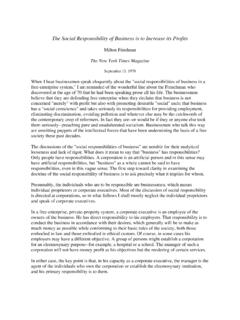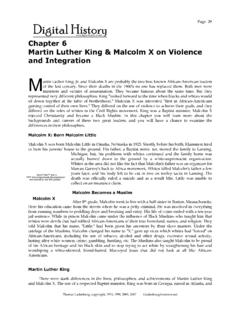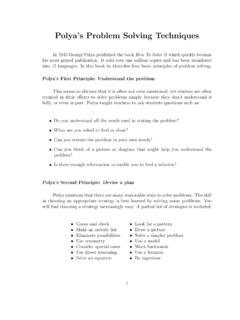Transcription of How to Make Our Ideas Clear Charles S. Peirce
1 How to Make Our Ideas ClearCharles S. PeircePopular Science Monthly 12 (January 1878), has looked into a modern treatise on logic of the common sort, will doubtless rememberthe two distinctions between Clear and obscure conceptions, and between distinct and confusedconceptions. They have lain in the books now for nigh two centuries, unimproved andunmodified, and are generally reckoned by logicians as among the gems of their Clear idea is defined as one which is so apprehended that it will be recognized wherever it ismet with, and so that no other will be mistaken for it.
2 If it fails of this clearness, it is said to is rather a neat bit of philosophical terminology; yet, since it is clearness that they weredefining, I wish the logicians had made their definition a little more plain. Never to fail torecognize an idea, and under no circumstances to mistake another for it, let it come in howrecondite a form it may, would indeed imply such prodigious force and clearness of intellect as isseldom met with in this world. On the other hand, merely to have such an acquaintance with theidea as to have become familiar with it, and to have lost all hesitancy in recognizing it in ordinarycases, hardly seems to deserve the name of clearness of apprehension, since after all it onlyamounts to a subjective feeling of mastery which may be entirely mistaken.
3 I take it, however,that when the logicians speak of "clearness," they mean nothing more than such a familiarity withan idea, since they regard the quality as but a small merit, which needs to be supplemented byanother, which they call distinct idea is defined as one which contains nothing which is not Clear . This is technicallanguage; by the contents of an idea logicians understand whatever is contained in its that an idea is distinctly apprehended, according to them, when we can give a precisedefinition of it, in abstract terms.
4 Here the professional logicians leave the subject; and I wouldnot have troubled the reader with what they have to say, if it were not such a striking example ofhow they have been slumbering through ages of intellectual activity, listlessly disregarding theenginery of modern thought, and never dreaming of applying its lessons to the improvement oflogic. It is easy to show that the doctrine that familiar use and abstract distinctness make theperfection of apprehension has its only true place in philosophies which have long been extinct.
5 And it is now time to formulate the method of attaining to a more perfect clearness of thought,such as we see and admire in the thinkers of our own Descartes set about the reconstruction of philosophy, his first step was to (theoretically)permit scepticism and to discard the practice of the schoolmen of looking to authority as theultimate source of truth. That done, he sought a more natural fountain of true principles, andthought he found it in the human mind; thus passing, in the directest way, from the method ofauthority to that of apriority, as described in my first paper.
6 Self-consciousness was to furnish uswith our fundamental truths, and to decide what was agreeable to reason. But since, evidently, notall Ideas are true, he was led to note, as the first condition of infallibility, that they must be distinction between an idea seeming Clear and really being so, never occurred to to introspection, as he did, even for a knowledge of external things, why should hequestion its testimony in respect to the contents of our own minds? But then, I suppose, seeingmen, who seemed to be quite Clear and positive, holding opposite opinions upon fundamentalprinciples, he was further led to say that clearness of Ideas is not sufficient, but that they need alsoto be distinct, , to have nothing unclear about them.
7 What he probably meant by this (for hedid not explain himself with precision) was, that they must sustain the test of dialecticalexamination; that they must not only seem Clear at the outset, but that discussion must never beable to bring to light points of obscurity connected with was the distinction of Descartes, and one sees that it was precisely on the level of hisphilosophy. It was somewhat developed by Leibnitz. This great and singular genius was asremarkable for what he failed to see as for what he saw.
8 That a piece of mechanism could not dowork perpetually without being fed with power in some form, was a thing perfectly apparent tohim; yet he did not understand that the machinery of the mind can only transform knowledge, butnever originate it, unless it be fed with facts of observation. He thus missed the most essentialpoint of the Cartesian philosophy, which is, that to accept propositions which seem perfectlyevident to us is a thing which, whether it be logical or illogical, we cannot help doing. Instead ofregarding the matter in this way, he sought to reduce the first principles of science to two classes,those which cannot be denied without self-contradiction, and those which result from theprinciple of sufficient reason (of which more anon), and was apparently unaware of the greatdifference between his position and that of Descartes.
9 So he reverted to the old trivialities oflogic; and, above all, abstract definitions played a great part in his philosophy. It was quitenatural, therefore, that on observing that the method of Descartes labored under the difficulty thatwe may seem to ourselves to have Clear apprehensions of Ideas which in truth are very hazy, nobetter remedy occurred to him than to require an abstract definition of every important , in adopting the distinction of Clear and distinct notions, he described the latterquality as the Clear apprehension of everything contained in the definition; and the books haveever since copied his words.
10 There is no danger that his chimerical scheme will ever again beover-valued. Nothing new can ever be learned by analyzing definitions. Nevertheless, ourexisting beliefs can be set in order by this process, and order is an essential element of intellectualeconomy, as of every other. It may be acknowledged, therefore, that the books are right in makingfamiliarity with a notion the first step toward clearness of apprehension, and the defining of it thesecond. But in omitting all mention of any higher perspicuity of thought, they simply mirror aphilosophy which was exploded a hundred years ago.






